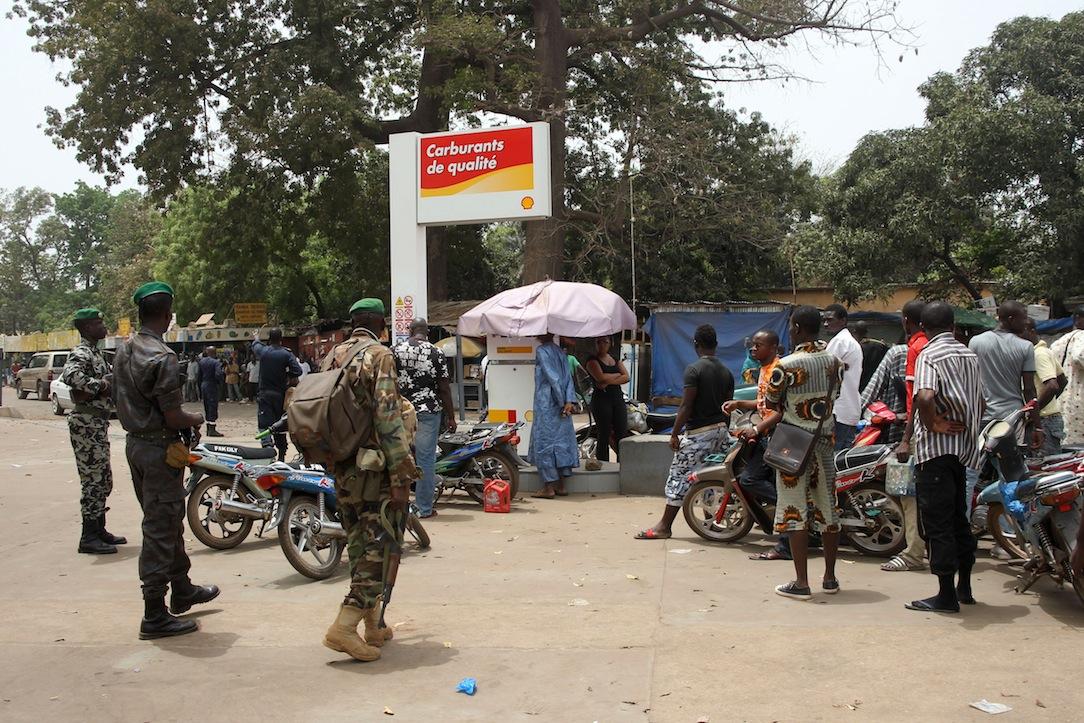Mali coup: Country slowly returns to ordinary life
Putschist soldiers (L) watch and protect people queuing at a gas station on March 24, 2012 in Bamako, three days after Malian President Amadou Toumani Toure was forced to flee his palace during an overnight coup.
BAMAKO, Mali — This capital city is slowly returning to normal, four days after the military coup against President Amadou Toumani Toure's government.
The army patrols the streets and has imposed a curfew until Tuesday. The location of Toure is still unknown. Mali's borders and airports remain closed until further notice.
At a gas station in central Bamako, lines of motorbikes and cars slowly advance toward the pumps.
The lines are long, but at least fuel is being sold. Immediately after the coup almost all pumps were closed and crowds of vehicle owners jostled to get a can of gas before the stocks ran out. Gas prices climbed to double, and even triple the normal cost.
In the shade of the gas station shop, three policemen sit behind a row of rifles resting on the asphalt. One intervenes when a minor dispute breaks out at the pump.
"Things are calm now," says Aliou Diarra, a police sergeant wearing a blue beret and uniform. "We needed a change of government. The cost of living was too high and there were troubles in the north," he says, referring to the Tuareg rebellion which was the starting point for Wednesday's military coup. "I won't say that ATT wasn't dealing with it well, but he wasn't putting in 100 percent. This coup was to save Mali."
The coup, which appears to have been unplanned, started Wednesday morning when soldiers revolted against the government's handling of the rebellion in the north, where ethnic Tuaregs are fighting for an independent homeland, armed with weapons from Colonel Gaddafi's Libya.
Disgruntled mid-ranking soldiers stormed the country's state broadcaster, ORTM, and took control of the presidential palace. By early afternoon, Bamako's streets became jammed with traffic from the upheaval. The sound of gunshots rang out into Thursday, with rejoicing soldiers firing into the air, some taking advantage of the chaos to loot shops and hijack cars.
A video message on ORTM announced that Captain Amadou Haya Sonogo was now in command of the country.
The initial reaction on the streets of Bamako was one of complete disbelief. Many respect Toure and say he presided over 10 years of largely well-functioning rule. Toure was preparing to retire in April, after scheduled elections to select his successor. Many people say that because the elections were to be held so soon, the coup seems completely misplaced.
Near the gas station, sitting outside a closed hairdressing shop, Omar Sylla, a 23-year old leather-worker, shakes his head as he boils tea on a small charcoal burner.
"Seriously," he says, lighting a cigarette off the burning coals, "after 20 years of democracy, Mali didn't need a coup d'etat. It's like we went forward 20 years, and now back again. It'll be another 20 years before we catch up again."
His friend sitting beside him, who does not want to give his name, says that he's sorry about what happened. "There were only a few weeks left for Toure in power. So why go and do a coup d'etat?"
But for all those who are sad about what happened, there are others who are pleased about the change. They charge that Toure's government was siphoning off money given by foreign donors like the United States for the military campaign in the north. They allege the government was sending Malian troops into battle in the desert hungry and poorly equipped.
"This is a good thing," says Souleyeman Sangare, a 43-year old taxi driver who leans out of his car window as the gas line inches forwards. "The leaders were not correct, the soldiers did not have uniforms and the higher ranks were taking all the money. And so the young people revolted. We all knew that ATT was going to give power to someone else to protect him and his family. The elections are rigged."
The recurring theme among people young and old and on both sides of the fences is a lack of faith in the democratic process. People who support the coup say that the elections would be rigged, and that things are better this way. Those who regret what happened say that the insurgency in the north would have destabilized the electoral process, and have no answer for what would have been a better path. All agree that things had to change.
Because of the border closure gas supplies are running low and the price of rice has doubled in some places. But people are calm, if subdued, and the situation is slowly returning to normal, with vehicles venturing back onto the roads and some shops opening in the mornings for basic supplies. The sometimes-shaky electricity supply seems to holding up.
However, there is a strong atmosphere of regret about the way the change of power was handled.
"All African countries took Mali as an example," says the tea-drinking Sylla, who has not been able to work since the new military regime took control of the country. "But now we are just a bad example."
